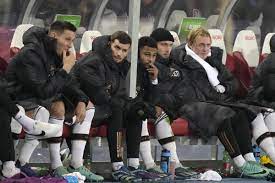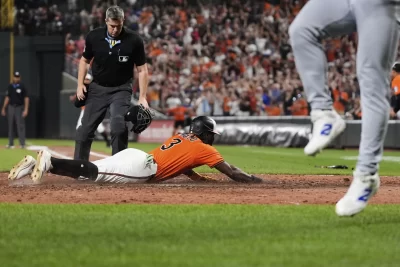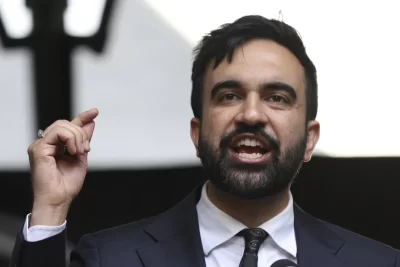
This was meant to be Germany’s rebuild year ahead of hosting the European Championship. The team is a wreck.
With less than seven months until the tournament, the defining moment of Tuesday’s 2-0 loss to Austria came when Leroy Sané was sent off for shoving an opponent.
Coming in a friendly with no particular bad blood between the teams, that incident seemed to reflect just how miserable and exasperating it’s become to play for four-time World Cup winner Germany.
“The red card for Leroy sums it all up. The frustration, the disappointment in ourselves too,” captain Ilkay Gündogan told broadcaster ZDF, adding there’s a lack of “positive energy” in the team.
Coach Julian Nagelsmann — who now has one win from his first four games — picked an attacking lineup with three forward players and two more, Kai Havertz and Julian Brandt, as nominal wing-backs. It didn’t work.
As 2023 began, there was a suggestion that elimination in the group stage of last year’s World Cup could be explained as a one-time event caused by an unfortunate mix of factors — political controversy, unfamiliar conditions, underestimating Japan in its opening loss.
Instead, 2023 will end with Germany having lost six of the 11 games it played and winning just three. Of the teams who beat Germany — Belgium, Poland, Colombia, Japan, Turkey and Austria — only Belgium is ranked in the top 10 in the world.
Worryingly for Germany fans, there’s no obvious link between all the bad results.
Germany has lost games at home and away, with Hansi Flick as coach, with Nagelsmann, with lineups of young players and grizzled veterans. On the biggest stages, this generation’s combined record from its last three major tournaments going back to 2018 is won three, drawn two, lost five.
Flick made little progress trying to integrate younger players, so Nagelsmann was hired in September on a short-term contract and the license to pick an older team. The starting lineup which failed to get the job done against Austria included five players over 30 and only one under 27.
Germany has called up 45 different players this year alone, but the only newer face to establish himself as a key player is Borussia Dortmund striker Niclas Füllkrug, with 10 goals in 13 games since November 2022.
One game Germany might take inspiration from is its 2-1 win over World Cup runner-up France in September. That win came in unusual circumstances under a temporary coaching team and three days after the 4-1 loss to Japan that ended Flick’s tenure, but showed a renewed fighting spirit that had otherwise seemed lacking.
Germany will next play in March, potentially offering some time to approach 2024 and the European Championship with a changed mindset.







